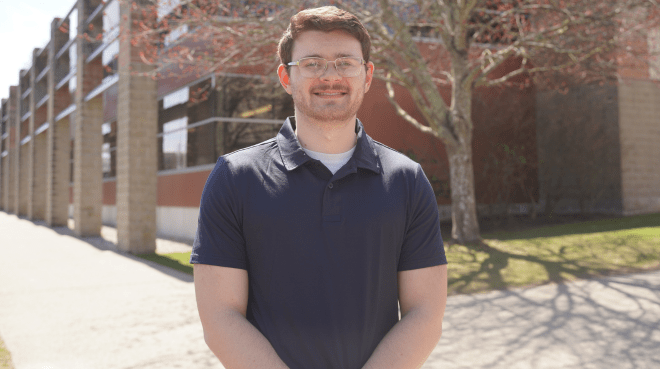Criminal Justice Grad Inspired to Keep Communities Safe as Criminal Investigator
Receiving his bachelorвҖҷs in Criminal Justice with the Class of 2024 in May, Sam Trieber is only a few months away from also earning his masterвҖҷs in the 4+1 Criminal Justice program

A Criminal Justice major and double minor in History and Psychology, Sam Trieber вҖҷ24 is drawing on his hands-on experiences at БщәПІКҝӘҪұЦұІҘ to propel him on a path to becoming a criminal investigator. Having completed his undergraduate degree this past December, Trieber, who lives in Boston, is on track to attain his M.S. in Criminal Justice by December 2024 through БщәПІКҝӘҪұЦұІҘ's 4+1 program.
Industry Experience: вҖңI got the opportunity to work part-time at the Tiverton, R.I., police station as a Community Service Officer. We donвҖҷt have weapons or do arrests, but we do drive around police vehicles, which is pretty fun. I get to go around and talk to people to make sure they feel safe around the town. ItвҖҷs been a great experience so far. Once I complete my graduate degree in December, I want to work at a local police department in a criminal investigations capacity вҖ“ investigating people who have been confirmed guilty and help with finding people to keep communities safer.вҖқ
Powerful Combinations: вҖңMy two minors, History and Psychology, have allowed me to expand my understanding of Criminal Justice. I think U.S. history lends itself to criminal justice because of its heavy influence on contemporary policies. Psychology and Criminal Justice just connect. I served on a jury a few years ago in a case involving civil commitment, and it made me realize how much psychology and criminal justice intertwine in the real world.вҖқ
Discovering His Passion: вҖңProfessor Beck Strah had us listen to podcasts for homework assignments. That is when I had the idea to use podcasts to create an empirical design research project that analyzes how inmates are doing in the current prison system. I chose four podcasts that were produced by inmates or someone who interacts with inmates. I analyzed the prison system structure by listening to them using Maslow's hierarchy of needs, and it made me see the realities of the prison systems in the U.S.вҖқ

